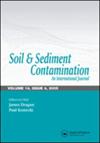Health‐based soil action levels for trivalent and hexavalent chromium: A comparison with state and federal standards
IF 1.5
4区 环境科学与生态学
Q4 ENVIRONMENTAL SCIENCES
引用次数: 34
Abstract
As part of the Brownfields initiatives being enacted at both the state and federal levels, environmental regulatory agencies are developing health‐based screening or action levels to facilitate the reclamation of unused industrial properties. By the end of 1997, approximately 90% of the states will have either adopted federal values or developed their own non‐site‐specific action levels. These standards can be applied as default cleanup levels, or alternative remediation standards may be developed based on a site‐specific risk assessment. A state and federal survey of cleanup levels for hexavalent and trivalent chromium [Cr(VI) and Cr(III)] indicated a general concurrence of approaches (i.e., most states are using the USEPA standard risk assessment model with upper‐bound estimates of exposure and USEPA toxicity criteria), although the proposed values vary by as much as 5 orders of magnitude. To understand the variability and uncertainty in these levels, the USEPA Soil Screening Level (SSL) (1996a) equatio...三价和六价铬的健康土壤作用水平:与州和联邦标准的比较
作为布朗菲尔德倡议的一部分,环境监管机构正在制定基于健康的筛查或行动水平,以促进未使用的工业物业的回收。到1997年底,大约90%的州要么采用联邦标准,要么制定自己的非特定地点行动标准。这些标准可以作为默认的清理水平,或者根据特定场地的风险评估制定替代的补救标准。一项关于六价铬和三价铬[Cr(VI)和Cr(III)]清理水平的州和联邦调查表明,尽管建议的值相差多达5个数量级,但采用的方法普遍一致(即,大多数州使用USEPA标准风险评估模型,其中包含暴露上限估计和USEPA毒性标准)。为了了解这些水平的可变性和不确定性,USEPA土壤筛选水平(SSL) (1996a)方程…
本文章由计算机程序翻译,如有差异,请以英文原文为准。
求助全文
约1分钟内获得全文
求助全文
来源期刊

Soil & Sediment Contamination
环境科学-环境科学
CiteScore
4.20
自引率
10.00%
发文量
53
审稿时长
2.2 months
期刊介绍:
When it comes to assessing and mitigating contaminated soils and sediments, there is no substitute for having the very latest tools, techniques and methodologies at your fingertips to help you deal with these issues efficiently and cost-effectively.
This is just the kind of essential expertise you’ll only find in Soil and Sediment Contamination . This internationally, peer-reviewed publication focuses on soil and sediment contamination from:
-Sludges-
Petroleum-
Petrochemicals-
Chlorinated hydrocarbons-
Pesticides-
Lead and other heavy metals.
Get detailed descriptions of all the latest and most efficient offsite and in situ remediation techniques, strategies for assessing health effects and hazards, and tips for dealing with everyday regulatory and legal issues. With the state-of-the-art tools that Soil and Sediment Contamination provides, you can successfully assess, mitigate, and solve both rural and urban soil contamination problems as efficiently and economically as possible.
 求助内容:
求助内容: 应助结果提醒方式:
应助结果提醒方式:


